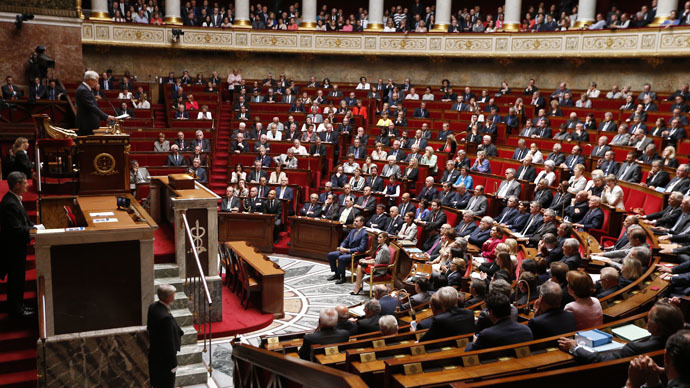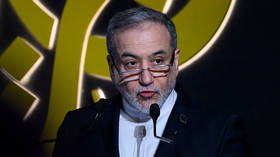Step closer to surveillance state? France passes new spying law

The French parliament has adopted new legislation, giving the intelligence services more leeway to spy on the public. The bill comes the same day as French politicians voiced anger over revelations of US spying on three French presidents.
French MPs in the lower house approved the highly controversial law, dubbed by critics as the French Patriot Act, with a simple show of hands. The bill that was first introduced in April, three months after the spree of terrorist attacks across France, received approval from the legislators in France's upper house earlier this month.
With their new legal powers French intelligence services may circumvent the need for judicial warrants to use wiretapping and other surveillance methods to gather intelligence from the public.
READ MORE: Obama tells Hollande US was not spying on French president
Private residences could now be monitored using geolocation measures, while mobile communications can be intercepted and web-page visits can be monitored using a complex algorithm that internet providers will be forced to install. Installation of keyloggers to track computer usage in real time will now also be possible.
The Interior Minister Bernard Cazeneuve warned against “any confusion” between the bill and tapping carried out by the NSA. “This bill does not allow blanket surveillance but rather forbids it,” he said, assuring that in no way does the new law endanger “individual freedoms.”
The Socialist Party, The Republicans (previously UMP), and the centrist IDU Party have overwhelmingly approved the bill, while the environmentalists and Left Front voted against.
Socialist Party member of the National Assembly, Jean-Jacques Urvoas welcomed the adoption of the law, calling it the first “creation” of a “democratic legal framework” on the activities of the intelligence services in France.
READ MORE: French 'Big Brother'? MPs approve sweeping new surveillance powers
Some others however opposed the law. MPs of all stripes, who consider the text “dangerous” will debate the issue on Thursday in front of the Constitutional Council to ensure compliance with the Constitution. French President Francois Hollande also promised to submit the new law for review to Constitutional Council.
Amnesty International previously described the bill as taking France “a step closer to a surveillance where nothing is secret except the surveillance itself.”
READ MORE: Hollande says US spying 'unacceptable' after WikiLeaks report, ambassador summoned
This law may lead to a “mass surveillance” that will create dangers for the freedoms, said Pierre Lellouche, member of the Union for a Popular Movement. The bill he argues “is not the best way to fight terrorism.”
Critics of the measure blatantly oppose metadata collection programs similar to that of the NSA bulk phone records program. Yet under the new law, authorities will be able to keep recordings for a month, and metadata for five years.
Voices in Brussels also raised concern about the legality of newly allowed surveillance gathering methods.
“It could raise important legal issues,” said the first vice-president of the European Commission, Frans Timmermans, in a letter to two right wing MPs as he expressed concern about possible violations of the European Charter of Fundamental Rights.
The adoption of the controversial intelligence law, comes shortly immediately after Hollande released a statement saying that the latest US spying revelations on three French Presidents is “unacceptable” and “France will not tolerate it.”
The allegations were first revealed by the French daily Liberation and on the Mediapart news website and WikiLeaks on Teesday. They say the NSA spied on Presidents Jacques Chirac, Nicolas Sarkozy and Francois Hollande from as early as 2006 until May 2012. The White House denied the allegations, with US President Barack Obama reassuring his counterpart the US has not and “will not target the communications of the French president.”











